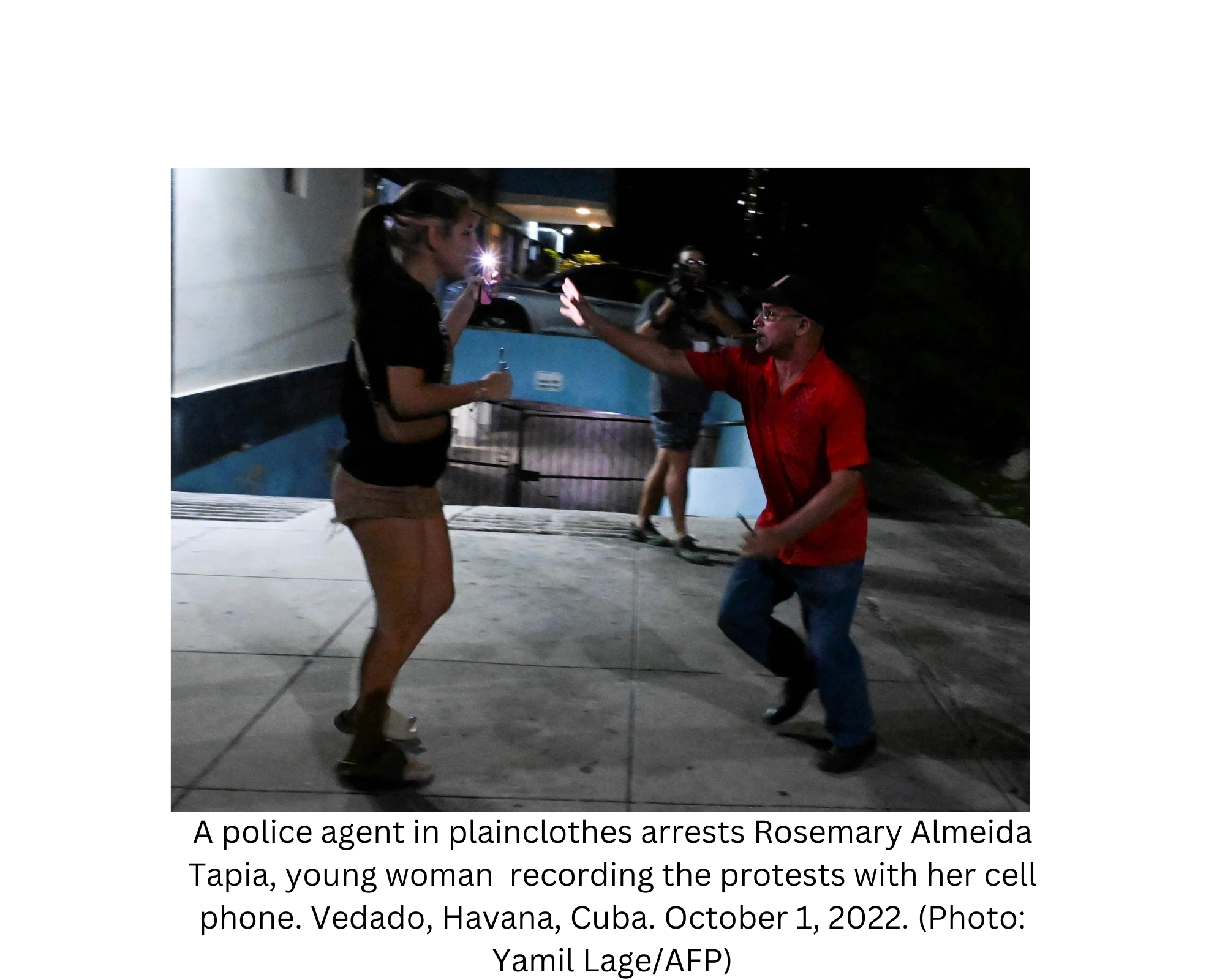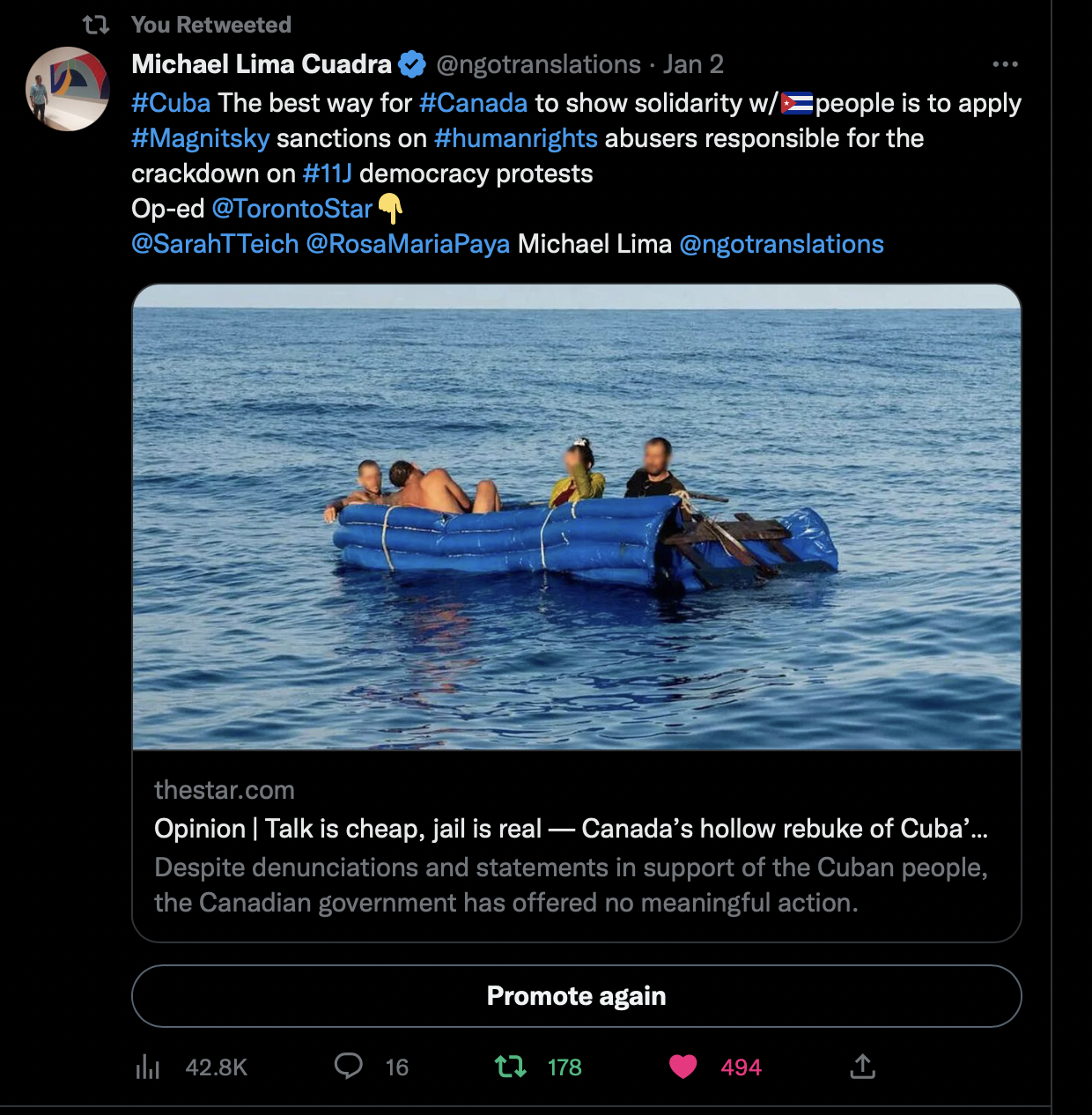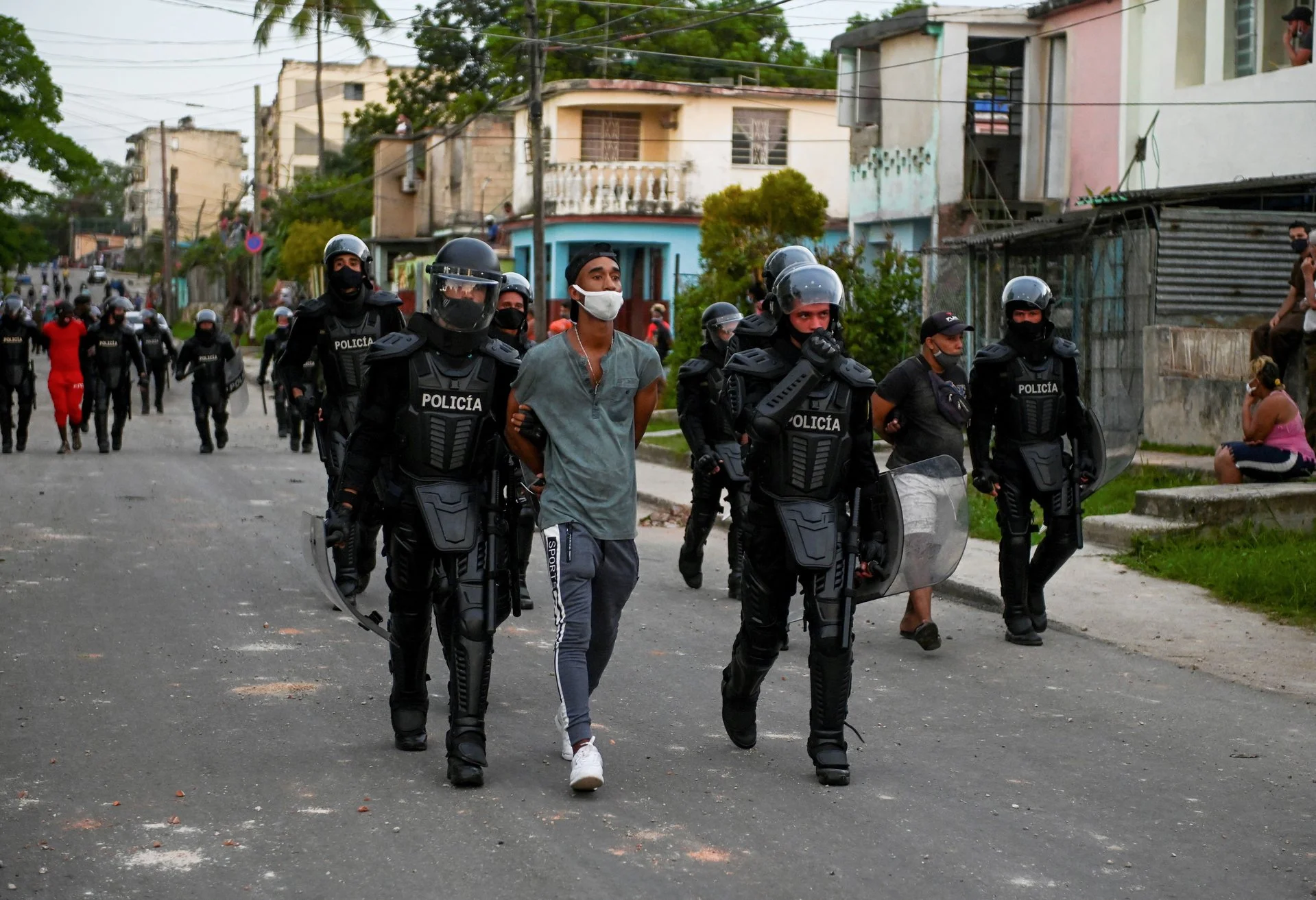MAGNITSKY SANCTIONS: CANADA'S MORAL DEBT TO VICTIMS OF REPRESSION IN CUBA
The so called president of Cuba, (hand picked ruler of the Castro family) Miguel Diaz Canel ordering the crackdown of pro democracy protesters on Cuban television vision. July 11, 2021.
For the countless victims of repression and relatives of political prisoners in Cuba Cuba it is not possible to hold accountable those at the top of the Interior Ministry and the Armed forces responsible for ordering and carrying out the mass repression that suppressed by force the July 11, 2022 pro democracy protests.
Cuba lacks an independent judiciary and independent media. Furthermore, members of the Interior Ministry (State Security, National Revolutionary Police, Special National Brigade, Coastguard, Penitentiary establishments) as well members of the Revolutionary Armed Forces including the Prevention Troops can only be prosecuted in military courts. Perpetrators in Cuba’s security apparatus are exculpated from committing acts of violence and human rights violations by resolutions and laws documented by Cubalex, Justicia 11 and several NGOs in a report titled “Torture in Cuba: Report of Civil Society Organizations to the United Nations Committee Against Torture,” published in March 2022.
To the best of our knowledge, and based on a review of news and reports on Cuba, there has not once been reference to any member of Cuba’s Interior Ministry ever found guilty by a military court for committing abuses and/or violence against human rights activists or regime critics. This emphasizes the need for Canada to impose targeted sanctions, to do its part to counter the impunity these officials enjoy domestically in Cuba.
With more than 42,000 views on Twitter, our op-ed titled “Talk is Cheap, Jail is Real — Canada’s hollow rebuke of Cuba’s crackdown,” published in the Toronto Star calling for Magnitsky sanctions on human rights abusers in the Cuban regime’s military apparatus attracted great attention and started a conversation in Canada and other nations.
In the face of this impunity, nations like Canada must move from statements condemning the repression in Cuba to concrete actions. A viable concrete action for Canada is the imposition of Magnitsky sanctions on members of the Cuban regime at the top of the power hierarchy. Canada currently condemns human rights predators in 21 authoritarian regimes around the world including Venezuela, Nicaragua, Belarus.
A man is detained during a demonstration against Miguel Diaz-Canel in the municipality of Arroyo Naranjo, Cuba, July 12, 2021. Thousands of Cubans participated in the July 11 demonstrations, chanting "Down with the dictatorship." (Photo: Yamil Lage/AFP)
After more than three decades of Canada's policy of engagement with Cuba, a change of approach is urgently required. Canada's strategy of dealing with human rights abuses in Cuba behind closed doors with Cuban regime officials has been counterproductive. In fact, Cuba is more repressive today than in July of 1994 when the policy of engagement was initiated by Jean Chretien's government. Levels of repression today in Cuba are the highest in decades.
TIME for Canada to take action. In an op-ed published by the Toronto Star on Jan 2, 2023 we set forth our arguments support of Canada’s imposition of Magnitsky sanctions on human rights abusers within Cuba’s military and police establishment.
Talk is cheap, jail is real — Canada’s hollow rebuke of Cuba’s crackdown
Despite denunciations and statements in support of the Cuban people, the Canadian government has offered no meaningful action.
By Sarah Teich
Rosa Maria Payá
Michael Lima
Contributors
Mon., Jan. 2, 2023
When hundreds of thousands of Cubans took to the streets in July 2021 in a peaceful protest seeking personal and political rights, the regime responded with a violent crackdown on its own population.
Cuba’s militarized autocracy made so many arrests in the aftermath of the protests that, today, the country still has over 1,000 political prisoners in its jails — that’s more than Venezuela and Nicaragua combined.
Human Rights Watch found Cuban officials systematically used “arbitrary detention, ill-treatment of detainees, and abuse-ridden criminal prosecutions,” as well as routine use of “brutal abuses” in detention, including sexual and gender-based violence.
The extreme use of arbitrary detention led the UN Committee on Enforced Disappearances to initiate urgent action for 187 cases in Cuba under the Convention on Enforced Disappearances.
Here in Canada, while officials condemned the crackdown, there has been little other than words.
At the time Prime Minister Justin Trudeau was “deeply concerned by the violent crackdown on protests by the Cuban regime” and said “Cubans have the right to express themselves and to have their voices heard.” Canada’s Global Affairs Department tweeted that “Canada condemns [Cuba’s] harsh sentencing following the July 2021 protests” and that “[we] stand with the people of Cuba in their aspiration for democracy.”
Despite these denunciations and statements in support of the Cuban people, the Canadian government has offered no meaningful action. In fact, less than a week after the protests, then Foreign Affairs Minister Marc Garneau met with the UN High Commissioner for Human Rights. In voicing Canada’s concerns about human rights cruelties in different countries across the world, he failed to even mention Cuba.
The United States, meanwhile, used its Magnitsky Act to impose targeted sanctions on Cuban officials and entities responsible for gross violations of human rights in the aftermath of the July 2021 protests.
Canada has an important voice in international forums, and effective human rights tools at our disposal, however, we are simply not using them. To give its policy some actual effectiveness, Canada needs to follow the policy recommendations of human rights organizations and impose targeted sanctions on perpetrators in Cuba, in a concerted alliance with the U.S.
Canada, which maintains diplomatic relations with Cuba and has traditionally not supported sweeping U.S. measures against the socialist state, essentially sees its Cuba policy as something of a counterweight to Washington’s rigid, far-reaching embargo. However, there is a clear and logical way that Ottawa can avoid broad-based sanctions, which target a country as a whole, but support the more precise tool of targeted sanctions that are levied against specific human rights violators and kleptocrats.
Ottawa would certainly not be forsaking its past principles by endorsing targeted sanctions against individual rights violators and international criminals. Canada already levels such targeted measures on individuals and entities for human rights violations, including Russia, China, Iran, and Venezuela.
Besides being consistent, deploying a similar strategy in Cuba is also warranted.
Cuba is a staunch supporter of Russia’s invasion of Ukraine; it collaborates with China on telecommunications and supports the Chinese Communist Party in international organizations; it has taken financial support from Iran, with Iran leveraging its Cuban relationship on at least one occasion to engage in cyber warfare against the U.S.
Yet Cuban officials continue to enjoy impunity for their crimes domestically. As Cuba deepens its alliances with other authoritarian regimes, it is crucial that Canada close the inconsistency gap of its foreign policy and take meaningful action to address the human rights crisis in Cuba and the threat that Cuban officials pose around the world.
Sarah Teich is an international human rights lawyer and a senior fellow at the Macdonald-Laurier Institute. Rosa María Payá is a human rights defender and founder of the Cuba Decide citizen initiative. Michael Lima is a human rights defender and founder of Democratic Spaces.




